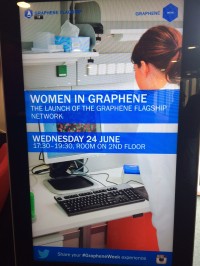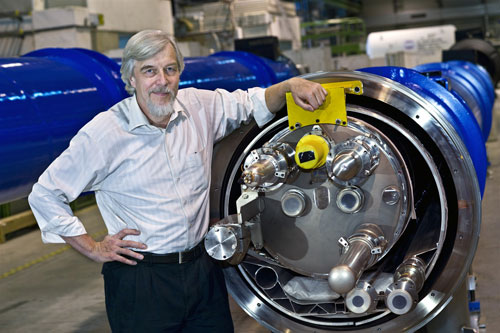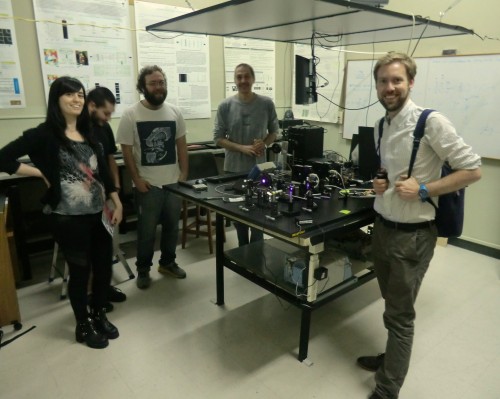Tag archives: careers
Women in graphene
By James Dacey in Manchester
 Today is the third day of Graphene Week, a conference at the University of Manchester devoted to the fundamental science and applications of 2D materials. While many of the talks require a PhD in materials science to even understand the title (I for one am struggling), one session taking place this evening has the refreshingly simple title: Women in Graphene. Intrigued, I caught up with the session organizer Katarina Boustedt from Chalmers University of Technology in Sweden.
Today is the third day of Graphene Week, a conference at the University of Manchester devoted to the fundamental science and applications of 2D materials. While many of the talks require a PhD in materials science to even understand the title (I for one am struggling), one session taking place this evening has the refreshingly simple title: Women in Graphene. Intrigued, I caught up with the session organizer Katarina Boustedt from Chalmers University of Technology in Sweden.
Graphene Week is an annual event organized by the Graphene Flagship, the EU’s biggest ever research initiative with a budget of €1 billion. As promoting equality is a key part of the Flagship’s mission, Boustedt has launched this initiative to support women working in 2D materials research. Tonight’s two-hour session is designed to start the conversation and find out the types of support that women researchers would like.
View all posts by this author | View this author's profile
Elect a physicist

Cast your vote for the Physics Party. (Courtesy: iStockphoto/TylaArabas)
By Margaret Harris
It’s the issue no-one is talking about in the run-up to the UK’s general election on 7 May, but I’m convinced that a brand-new party is set to make significant inroads on the British political scene, increasing both its overall share of the vote and its number of parliamentary seats.
“What is this bold new force?” I hear you ask. “Is it the Green Party? The Scottish or Welsh nationalists? The UK Independence Party (UKIP)?” My friends, it is none of these. Nor is it the Conservatives, Labour or the Liberal Democrats (the three parties that traditionally grab the lion’s share of seats at Westminster), or any of the parties representing Northern Ireland. It is something far more novel. More interesting. And above all, more able to solve the Schrödinger equation.
I’m talking about the Physics Party.
View all posts by this author | View this author's profile
Supporting industrial physicists
By Michael Banks in San Antonio, Texas
Here is a stat for you: around 50% of US physics graduates (both undergraduates and postgraduates) go on to work in industry.
Whether you think that is good or bad, the American Physical Society (APS) wants to do more to support those physicists who don’t pursue a career in academia.
View all posts by this author | View this author's profile
The STEM employment paradox, revisited
By Margaret Harris
Why, at a time when we hear so much about the UK’s shortage of scientific and technical skills, do unemployment rates among new science graduates remain stubbornly higher than average? This question has been bugging me for some time. Back in 2012, I wrote a blog post about it, suggesting that the answer might be a mismatch between what universities teach and what employers need. But that answer never really satisfied me, so for the graduate careers section in this month’s Physics World, I’ve examined the subject more carefully.
View all posts by this author | View this author's profile
The October 2014 issue of Physics World is now out
By Matin Durrani
There’s some great material in the October issue of Physics World, which is out now in print and digital formats. Highlights include a look at Europe’s Rosetta mission, which is set to land a probe on a comet for the very first time, an analysis of whether pulsars could be used to detect gravitational waves, and a great feature by University of Maryland physicist James Gates, who insists that although CERN’s Large Hadron Collider has so far seen no signs of supersymmetry, the search for SUSY must go on.
Another great article in the issue is by my colleague Margaret Harris, who is Physics World‘s careers editor. She’s written an in-depth study of what we’re dubbing the “STEM shortage paradox”. This is the curious fact that many employers in the UK say they are struggling to find enough good people with science, engineering, technology and maths (STEM) backgrounds, whereas at the same time lots of physics graduates are finding it hard to get jobs. So is there a really a “STEM shortage”, or do STEM graduates have the wrong skills, aren’t good enough or want to work in other fields? In the video above, Margaret outlines her motivations for writing the article.
View all posts by this author | View this author's profile
A scientific pyramid scheme, symmetry through the ages, why physics students are “standing a little taller” and more

Pyramid power: this lovely object has nothing to do with postdocs. It is a simpler version of a much larger Sierpinski tree that can be found on London’s South Bank.
By Hamish Johnston
Just this week six people were convicted in Bristol of crimes related to running a pyramid scheme. This involves taking money from lots of new investors and giving it to a smaller number of investors who signed up earlier – until the pyramid collapses. Is the current model for training scientists a pyramid scheme of sorts? That is the claim in a piece on the US’s National Public Radio (NPR) website written by Richard Harris.
View all posts by this author | View this author's profile
A day in the life of CERN’s director-general

All in a day’s work. (Courtesy: CERN)
By Rolf-Dieter Heuer, Geneva
There is no such thing as a typical day in the life of a CERN director-general (DG), certainly not this one in any case. In my experience, each incumbent has carved out a slightly different role for themself, shaped by the laboratory’s priorities and activities at the time of their mandate. For me, every day goes beyond science, management and administration, and I am particularly fortunate to have been DG through a remarkable period that has seen not only the successful launch of the Large Hadron Collider (LHC) and confirmation of the Brout–Englert–Higgs mechanism, but also an opening of CERN to the world – an area that I have pursued with particular vigour.
As I regularly joke, we have changed the “E” of CERN from “Europe” to “Everywhere”, and that has meant a lot of travel for the CERN DG, as we hold discussions with prospective new members of the CERN family. And when the CERN Council opened up membership to countries from beyond the European region in 2010, it seemed to me that we should also be extending our contacts in other directions as well.
View all posts by this author | View this author's profile
Connecting physics with Argentine industry

That’s me on the right visiting an optics lab at the University of Buenos Aires.
By James Dacey in Buenos Aires, Argentina
This week, physics PhD students and advanced undergraduates from across Argentina will flock to the University of Buenos Aires for the physics department’s winter school. It’s an annual event where budding researchers spend a few days at the nation’s premier academic institution to learn about some of the latest developments in fundamental research. The year, however, the meeting will be focused on bridging the gap between academia and industry.
I’ve been in Buenos Aires as part of a fact-finding mission to learn about the physics-education system in Argentina. After meeting with various people involved with Argentine physics education, it seems to me that the theme of this year’s winter school at the University of Buenos Aires is indicative of a change in the way physics is being presented to students. The subject is being rebranded from a purely intellectual pursuit into a practical science that can equip students with highly sought-after professional skills. The bigger picture, of course, is that right now the Argentine economy needs all the fresh ideas and workforce it can get!
Ice cream that changes colour, tag-team parenting and the ITER director-general hits back

Shades of pink: the Xamaleón ice cream in action. (Courtesy: IceXperience)
By Hamish Johnston
It has been a cracker of a summer here in south-west England, with lots of sunshine and temperatures in the mid-twenties just about every day. Not surprisingly, I have been eating my fair share of ice cream, but unlike this concoction whipped up by a physicist-turned-chef in Spain, the stuff you get in Bristol does not change colour when you lick it!
British scientists from ethnic minority backgrounds share their life stories
By James Dacey
What does it mean to be a scientist from an ethnic minority background? Is it harder to get career breaks and to reach the top of a field? Can your background actually be a source of inspiration? Is it even useful to anyone to be discussing these questions?
These are among the issues touched upon in a new series of video interviews with 10 British scientists with minority ethnic heritage. The interviews were conducted by researchers at the British Library as part of a larger audio history project commissioned by the Royal Society called Inspiring Scientists: Diversity in British Science. You can watch all 10 interviews on the Royal Society website.
